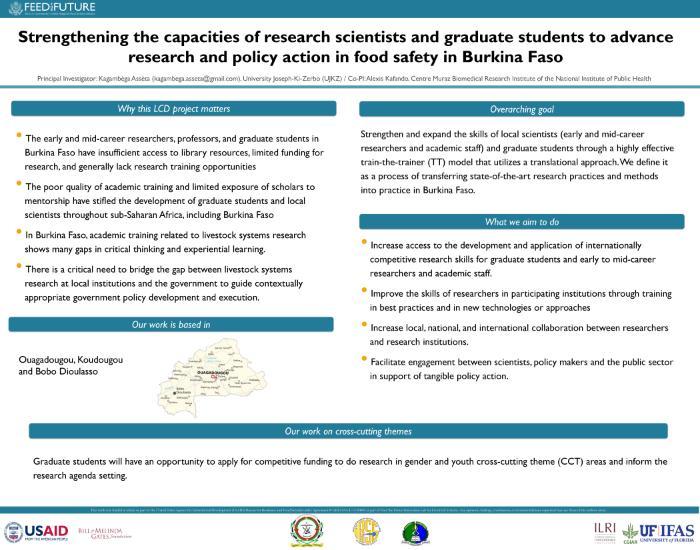Strengthening the Capacities of Research Scientists and Graduate Students to Advance Research and Policy Action in Food Safety in Burkina Faso
- Research Project Location: Burkina Faso
- Timeframe: April 2024 – August 2025 (Terminated in February 2025)
- Funding: USAID
Introduction
Early and mid-career researchers, professors, and graduate students in Burkina Faso have insufficient access to library resources, limited funding for research, and generally lack research training opportunities. Poor quality academic training and limited exposure of scholars to mentorship have stifled their development.
There is a critical need to bridge the gap between livestock systems research at local institutions and the government to guide contextually appropriate government policy development and execution. The aim of this project was to strengthen and expand the skills of local scientists and graduate students through a train-the-trainer model that uses a translational approach. It is a process of transferring state-of-the-art research techniques and methods into practice in Burkina Faso.
Project Goal and Objectives
The goal was to strengthen and expand the skills of local scientists (early and mid-career researchers and academic staff) and graduate students through a highly effective train-the-trainer (TT) model that utilizes a translational approach. We define it as a process of transferring state-of-the-art research practices and methods into practice in Burkina Faso.
The objectives of the project were to:
- Increase access to the development and application of internationally competitive research skills for graduate students and early to mid-career researchers and academic staff.
- Improve the skills of researchers in participating institutions through training in best practices and in new technologies or approaches.
- Increase local, national, and international collaboration between researchers and research institutions.
- Facilitate engagement between scientists, policy makers and the public sector in support of tangible policy action.
Background
Discussions with local livestock experts indicate that academic training related to livestock systems research shows many gaps, particularly in critical thinking and experiential learning. Students are yet to master the research design, data management and analytics, scientific writing and communication, and translational approaches needed to bridge the gap between the scientific community, policymakers and the public.
Research Approach
A system-wide approach will be used to co-design training with stakeholders that will define context-specific research programs and address priority gaps in food security and One Health. Scalable train-the-trainer modules will be developed under the guidance of international mentors who will provide participating researchers, academic staff, and students with accessible and relevant skills and research methods as well as translational approaches for effective communication with policymakers and the public sector. The modules will be digitalized for use by others in Burkina Faso and potentially in other Francophone countries.
Networking opportunities will be offered to increase collaboration between local, national and international institutions.
Principal Investigator (PI) and Lead Institution
Kagambèga Assèta, University Joseph Ki-Zerbo (UJKZ)
Co-Principal Investigator
Alexis Kafando, Centre Muraz Biomedical Research Institute of the National Institute of Public Health
Additional Collaborators
- The Health Sciences Research Institute (IRSS, Institut de Recherche en Sciences de la Santé)
- Université Norbert Zongo
Resources






